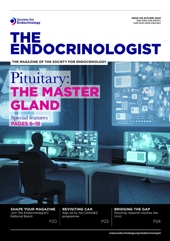Ren Renwick is Chief Executive Officer of The Pituitary Foundation, a charity offering practical, emotional and peer support to everyone living with or affected by a pituitary condition. Ren has a wealth of experience in the charity sector. Here, she tells us how The Pituitary Foundation works alongside patients, their support networks and healthcare professionals to raise pituitary awareness and reduce time to diagnosis.
What does The Pituitary Foundation do?
We are the UK’s patient support group for people living with pituitary conditions of all kinds. At the heart of our work is our range of support services: we have two helplines, one staffed by specialist nurses, and the other by wonderful volunteer pituitary patients. These are free to access and are invaluable to many people. We also run volunteer-led support groups, which provide a forum for people to connect, share experiences and learn from each other, and we produce print and online resources about living with different pituitary conditions.
‘It’s especially important that the next generation of clinicians is engaged in pituitary conditions, and that they specialise to ensure the treatment can continue to be excellent.’
Raising awareness is another key part of our work, and we engage with policymakers and the NHS to improve conditions for the pituitary community. Alongside this, we’ve got a fantastic fundraising programme to help us provide our services – from mountain hikes to marathons, and the gentler programme of drinks and talks – there is a way for everyone to get involved!
What is most exciting about your job?
The people! Speaking with patients and their families is hugely inspiring. The generosity with which people share their experiences and look to help others is incredible. Our volunteers are brilliant – giving up their time to lead support groups, speak on the helpline and guide and inform our work through committees and boards.
We are very lucky to have wonderful engagement with endocrine professionals who work with us to support the best possible care for patients. It’s so exciting to see the research in the area, alongside the incredible care that is provided, day in, day out.
What achievement are you most proud of?
We’ve recently launched our new website, with a refreshed visual identity and edited content. The team put in a huge amount of work to make the site easy to navigate, so people can find the information they need quickly. We’ve had great feedback on the site, and are enjoying continuing to develop it.
What are the biggest challenges for the Foundation?
Like any small charity, we have pretty tiny margins, and the financial landscape is challenging. We are reliant on donations as well as grants and sponsorship. We recognise that finances are increasingly tight for everyone – but we know our services are still needed and are committed to keeping the support in place. Our membership scheme is a fantastic way to be part of our community and support our work. It’s an affordable yearly amount, and means a lot to us and our activities.
Why is increasing public knowledge so important?
If more people knew about pituitary conditions it could help reduce the time to diagnosis, which would be hugely beneficial. The trauma of a delayed diagnosis can have a lasting impact, on top of the management of a condition. I’d love more people to understand the effect that different pituitary conditions can have and how people living with conditions can be supported.
‘We need to look to the future and ensure that the next generation of pituitary patients receives the best care possible.’
October marks Pituitary Awareness Month, and this year’s theme is ‘Spotlight on prolactin’. We will be raising awareness of prolactin and prolactinoma. Throughout the month, we’ll host information events and support groups, and share resources around the subject.
I’d also love it if every single person diagnosed with a condition knew about our services. We reach and support thousands of people each year, but there is still work to do in making sure we are available and accessible to everyone.
What more is needed to educate clinicians about pituitary conditions?
The Society for Endocrinology has brilliant meetings, which enable clinicians to share new research and insights into the field. It’s especially important that the next generation of clinicians is engaged in pituitary conditions, and that they specialise to ensure the treatment can continue to be excellent.
We also know that there are issues with awareness amongst general ward, A&E and primary care staff. There are some great developments which really help patients, like the introduction of the Steroid Emergency Card and the renaming of AVP deficiency (diabetes insipidus). We do a lot of work around raising awareness amongst different clinical groups, and are hoping to create a new GP training module on pituitary conditions.
I’d love every clinician to know about our services and to signpost them for all of their patients.
What are your key aims over the next few years?
We’ve got so much to do! We’ve agreed a really ambitious strategy which drives forward the support to people living with conditions. But we recognise that, post-pandemic, we’re working alongside a health service that’s under unprecedented pressure. We also know that the needs of patients are changing, and mental health increasingly needs to be addressed. We want to see support evolving to address these changing needs, while remaining of the highest quality.
We’ve also recognised that we need to look to the future and ensure that the next generation of pituitary patients receives the best care and diagnosis possible. We need to consider how technological advances can support this, and what the relationship with the NHS will be like under successive governments.
I’m excited for the future – we have a great team of staff, as well as clinicians who give their time and expertise in spades, incredible volunteers and inspiring, generous-spirited patients. Everything is possible!






